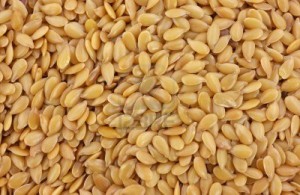Flaxseeds have gained popularity as being beneficial in treating a variety of diseases from attention deficit hyperactivity disorder to cancers of breast, prostate and colon, and heart diseases. Although more research is needed to establish conclusive evidence that flaxseeds may be prescribed for the several more illnesses, one thing we can be sure – That is, flaxseeds are the highest plant source with omega 3 fatty acids and they are very high in lignans and mucilages (soluble fibre).
Flax Seed Nutrition
Yes, flax seed is high in most of the B vitamins, magnesium, and manganese, but this little seed is just getting started. There are three additional nutrient groups which flax seed has in abundance, and each has many benefits.
Flax Seed is Rich in Omega-3 Fatty Acids: Omega-3 fatty acids are a key force against inflammation in our bodies. Mounting evidence shows that inflammation plays a part in many chronic diseases including heart disease, arthritis, asthma, diabetes, and even some cancers. This inflammation is enhanced by having too little Omega-3 intake (such as in fish, flax, and walnuts), especially in relation to Omega-6 fatty acid intake (in oils such as soy and corn oil). In the quest to equalize the ratio of these two kinds of oils, flax seed can be a real help.
Flax Seed is High in Fiber: You’d be hard-pressed to find a food higher in fiber — both soluble and insoluble — than flax. This fiber is probably mainly responsible for the cholesterol-lowering effects of flax. Fiber in the diet also helps stabilize blood sugar, and, of course, promotes proper functioning of the intestines.
Flax Seed is High in Phytochemicals: Flax seed is high in phytochemicals, including many antioxidants. It is perhaps our best source of lignans, which convert in our intestines to substances that tend to balance female hormones. There is evidence that lignans may promote fertility, reduce peri-menopausal symptoms, and possibly help prevent breast cancer. In addition, lignans may help prevent Type 2 diabetes.
Flax Seed Safety and Side Effects
Concerns about flax seed revolve around four potential issues. However, remember that a lot of research about the wonders of flax show little or no problems from eating it –- to the contrary, it has shown many benefits.
Big Fiber Load: Since flax has such a high fiber content, it’s best to start with a small amount and increase slowly; otherwise, cramping and a “laxative effect” can result. People with irritable bowel syndrome may have an especially strong reaction to it, and should be extra-careful.
Here is how we can make the best use of flaxseeds.
1. Flaxseeds absorb water 10 to 14 times its weight because of its high fibre content. This behaviour makes it an effective laxative in those who have constipation, gives bulking effect, reduces hunger in those trying to eat less and helps in binding with and removing fats and cholesterol. Take one tablespoon of ground flaxseeds mixed with 5 to 10 ounces of water to curb hunger between meals or as a therapy to reduce cholesterol or blood sugar. The high fibre content also makes flaxseeds a good ingredient in foods that would control blood sugar.
2. Add ground flaxseeds to your salad. The ground form is more digestible and hence it is best used ground.
3. Add to your bowl of cereal or oatmeal to increase the health benefits.
4. Add to soups, lassi, dosa batter, chapatti dough, buttermilk, upuma (after cooking), casseroles, fruit smoothies, juices or low fat milk or to chutneys.
5. As compared to one tablespoon of walnut oil or canola oil, just one teaspoon of flaxseed oil provides equivalent alpha linolenic acid that is cardioprotective.
6. One to two tablespoon of flaxseeds or one to two teaspoon of flax seed oil is required a day for adults (over 18 years) to derive its benefits.
7. Ground flaxseeds will lose the nutritive value if exposed to air or sunlight. Therefore, it should be stored in an airtight container and kept in a dark cool place. It is best to buy whole flaxseeds and grind a little at a time, say whatever amount is needed for a week and then store it in the fridge.
9. Heat destroys the oil so flax seed oil should be added only to cold foods.
10. When initially starting to use flaxseeds, use small amounts to make sure you are not allergic to it. Pregnant and lactating ladies and children should consult a physician before opting to include flaxseeds in their diet.
Drinking plenty of water throughout the day when you take flaxseeds is essential. Because of its fibre content, ground flaxseeds are preferred to flax seed oil and healthier.
If you are a vegetarian, take 2 tablespoons a day. If you are eating fish regularly, then one tablespoon of flaxseeds will do.

